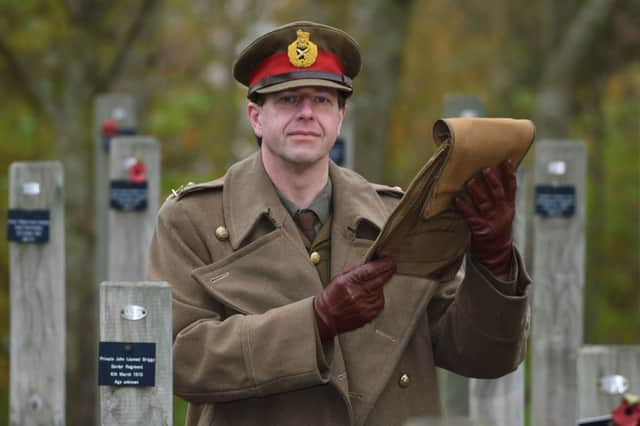General’s letter reveals fear and joy during Christmas truce of 1914


The first-hand account of troops from opposing sides sharing cigars and playing football as the First World War continued to rage nearby was written by General Sir Walter Congreve VC.
The letter was donated to Staffordshire’s archive service in the 1970s and came to light during research to mark the centenary of the outbreak of war.
Advertisement
Hide AdAdvertisement
Hide AdSent to Sir Walter’s wife, the document details how news of the Christmas Day football match spread quickly along the front-line.
Sir Walter, who led the Rifles Brigade, drafted the letter after visiting trenches near Neuve Chapelle in Northern France on Christmas Day.
The commander, who survived the war despite losing his left hand in action, wrote: “I found an extraordinary state of affairs - this a.m. a German shouted out that they wanted a day’s truce & would one come out if he did.
“So very cautiously one of our men lifted himself above the parapet & saw a German doing the same.
Advertisement
Hide AdAdvertisement
Hide Ad“Both got out then more & finally all day long in that particular place they have been walking about together all day giving each other cigars & singing songs.”
Describing how officers including several captains and a German colonel had joined the temporary ceasefire, Sir Walter added that he was reluctant to take part for fear that shots might be fired at such a high-ranking officer.
He wrote: “I was invited to go & see the Germans myself but refrained as I thought they might not be able to resist a general.
“My informant, one of the men, said he had had a fine day of it & had smoked a cigar with the best shot in the German army, then not more than 18.
Advertisement
Hide AdAdvertisement
Hide Ad“They say he’s killed more of our men than any other 12 together but I know now where he shoots from & I hope we down him tomorrow.
“I hope devoutly they will.”
The letter, now on public display at Stafford’s Records Office, chronicles how some battalions continued to exchange fire, while others played football with their German counterparts.
Anthony Richards, of the Imperial War Museum, hailed the letter as an interesting addition to the various accounts of the Christmas truce story.
“A particularly nice feature of the letter is Congreve’s reluctance to witness the truce for himself, fearing the temptation for the enemy to have a shot at him,” he said.
Advertisement
Hide AdAdvertisement
Hide AdCouncillor Ben Adams, cabinet member responsible for Archives at Staffordshire County Council, said: “The fact that the letter has come to light in the year we commemorate the centenary of the Great War makes its existence even more special.
“We are incredibly proud to be the custodian of such a valuable document which we will protect and preserve so it can be shared and enjoyed for years to come.”
Sir Walter, who was born in Chatham, Kent, was awarded the Victoria Cross for gallantry in the face of the enemy during the Second Boer War in 1899. His son, Major William La Touche Congreve, was also honoured with a Victoria Cross after being killed in the Battle of the Somme in July 1916.